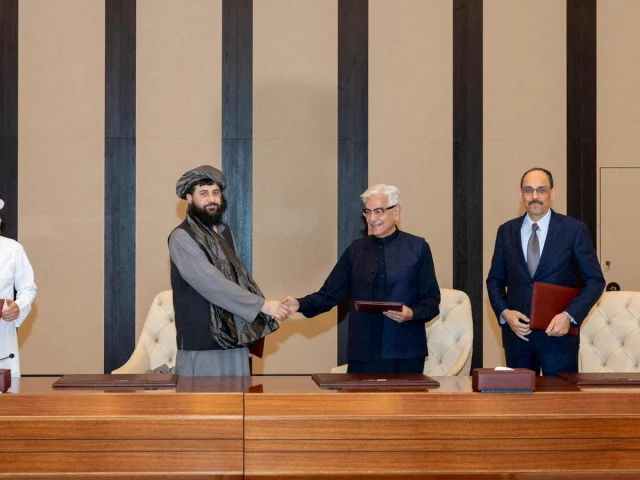Defense Minister Khawaja Muhammad Asif and Afghan Defense Minister Mullah Mohammad Yaqoob Mujahid shake hands after signing a ceasefire agreement brokered by Qatar and Turkey in Doha on October 19. Photo: Reuters
Top intelligence officials from Pakistan and the Afghan Taliban regime began a series of crucial negotiations in Istanbul on Thursday, aimed at finding a workable plan to end terrorist attacks emanating from across the border.
Mediated by Turkey and Qatar, the talks continued for over eight hours until this report was filed. There were both direct sessions and some indirectly through mediators, according to sources. Unlike previous rounds, this time there was no deliberate leak from either side.
According to official sources, the Pakistani delegation, led by Director General Inter-Services Intelligence (ISI) and National Security Advisor Lt General Asim Malik, held talks with the Afghan delegation led by Intelligence Chief Abdul Haq Wasiq.
The talks are being led by a neutral third party and aim to restore mutual trust after weeks of deadly cross-border skirmishes and growing friction between Islamabad and Kabul.
The latest meeting came as the Information Ministry confirmed a “ceasefire violation” along the Chaman border, where Afghan elements opened fire without provocation on Pakistani posts. “Our security forces responded quickly and responsibly, bringing the situation under control,” the ministry said in a statement Thursday evening.
The statement rejected Afghan claims regarding the incident and stressed that the firing was initiated from the Afghan side. “Pakistan remains committed to the ongoing dialogue and expects mutual cooperation from the Afghan authorities,” he added.
Despite the surge in violence, officials said both sides remained seated at the negotiating table in Istanbul. However, after nearly eight hours of discussions, there was no sign of progress.
Diplomatic sources suggested the talks had been “frank and direct”, with Pakistan seeking firmer commitments from Kabul to curb cross-border terrorism, particularly attacks by the banned group Tehreek-e-Taliban Pakistan (TTP).
The Afghan delegation reportedly insisted that any de-escalation would require mutual restraint and more confidence-building measures from Pakistan.
The Istanbul meeting follows two previous rounds of engagements between the two sides. The first round, held in Doha last month, resulted in a temporary ceasefire agreement after an intense exchange of fire along the border.
The second round, also organized in Istanbul, ended with an agreement by the two delegations on the continuation of dialogue to avoid further escalation.
Earlier this week, Pakistan’s chief military spokesperson, Lt. Gen. Ahmed Sharif Chaudhry, warned that any further cross-border aggression would result in a “firm and decisive response”, signaling Islamabad’s growing impatience with the Afghan regime’s inaction against the TTP.
Officials familiar with the discussions in Istanbul said The Express PK Press Club that even if the tone of engagement remained courteous, “trust is at its lowest level”. One official described the session as a “watershed moment” for the fragile agreement the two sides reached in October.
Lt. Gen. Asim Malik, considered one of Pakistan’s most influential figures after the army chief, is said to have urged Kabul to show “seriousness and sincerity” if it wants to preserve the fragile truce and avoid a wider confrontation.
Meanwhile, Taliban delegates, including Deputy Interior Minister Haji Najib and Foreign Ministry spokesperson Abdul Qahar Balkhi, were joined by figures such as Sohail Shaheen and Anas Haqqani, emphasizing the importance Kabul attaches to dialogue.
For the moment, the two delegations remain discreet about the result. But as the Istanbul meeting continues into the night, officials acknowledge that while diplomacy is still alive, the window for meaningful progress is rapidly narrowing.




